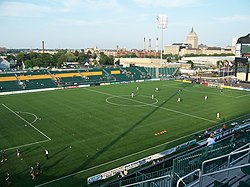반레닌주의
Anti-Leninism| 다음에 대한 시리즈 일부 |
| 자유사회주의 |
|---|
 |
| 다음에 대한 시리즈 일부 |
| 좌파 공산주의 |
|---|
 |
반레닌주의는 블라디미르 레닌이 주창하는 정치철학 레닌주의에 대한 반대다.
조기반대
마르크스주의자들의 반대
레닌주의와 레닌의 인물에 대한 반대는 러시아 사회민주노동당이 러시아 사회민주노동당 제2차 대회에서 멘셰비키와 볼셰비키 파벌로 분열된 데서 비롯된다. 레닌에 대한 볼셰비키 반대는 의회 참여를 반대했던 오트조프주의자들(혹은 리콜주의자들)의 등장으로 일어났다. 그들은 알렉산더 보그다노프, 미하일 포크로프스키, 아나톨리 루나차르스키, 안드레이 부보노프를 포함했다. 레닌주의와 볼셰비즘에 대한 멘셰비키 반대는 본질적으로 그들이 본 레닌의 권위주의적 성격과 마르크스주의 국가를 이룩하기 위한 방법에 근거하고 있었다. 율리우스 마르토프가 사형제 복원을 규탄하는 등 10월 혁명에 이어 이런 반대는 더욱 거세졌을 뿐이다.[1] 러시아 공산주의의 맥락에서 반레닌주의는 레닌이 1917~1924년 재위 기간 동안 국가 지도자로 제거되기를 바랐던 사람들의 맥락에서도 볼 수 있는데, 이는 전쟁 공산주의와 같은 정책을 너무 극단적으로 본 온건파들과 신경제정책과 같은 정책을 카피에 대한 모독으로 본 강경파들 둘 다에서 비롯되었다.부적 기질
Eduard Bernstein and Rosa Luxemburg have criticised Lenin,[2] asserting that his conception of revolution was elitist and essentially Blanquist. As part of a longer section on Blanquism in her "Organizational Questions of Russian Social Democracy" (later published as "Leninism or Marxism?"), Luxemburg writes: "For Lenin, the difference between the Social Democracy and Blanquism is reduced to the observation that in place of a handful of conspirators we have a class-conscious proletariat. He forgets that this difference implies a complete revision of our ideas on organization and, therefore, an entirely different conception of centralism and the relations existing between the party and the struggle itself. Blanquism did not count on the direct action of the working class. It, therefore, did not need to organize the people for the revolution. The people were expected to play their part only at the moment of revolution. Preparation for the revolution concerned only the little group of revolutionists armed for the coup. Indeed, to assure the success of the revolutionary conspiracy, it was considered wiser to keep the mass at some distance from the conspirators".[3]
"Left-Wing" Communism: An Infantile Disorder is a work by Lenin attacking assorted critics of the Bolsheviks who claimed positions to their left. Most of these critics were proponents of ideologies later described as left communism. Left communism is the range of communist viewpoints held by the communist left, which criticizes the political ideas of the Bolsheviks at certain periods, from a position that is asserted to be more authentically Marxist and proletarian than the views of Leninism held by the Communist International after its first and during its second congress. Another early analysis the Soviet Union as state capitalist came from various groups advocating left communism. One major tendency of the 1918 Russian communist left criticised the re-employment of authoritarian capitalist relations and methods of production. As Ossinsky in particular argued, "one-man management" (rather than the democratic factory committees workers had established and Lenin abolished) and the other impositions of capitalist discipline would stifle the active participation of workers in the organisation of production. Taylorism converted workers into the appendages of machines and piece work imposed individualist rather than collective rewards in production so instilling petty bourgeois values into workers. In sum these measures were seen as the re-transformation of proletarians within production from collective subject back into the atomised objects of capital. It was argued that the working class had to participate consciously in economic as well as political administration. This tendency within the 1918 left communists emphasized that the problem with capitalist production was that it treated workers as objects. Its transcendence lay in the workers' conscious creativity and participation, which is reminiscent of Marx's critique of alienation.[4] These criticisms were revived on the left of the Russian Communist Party after the Tenth Congress in 1921, which introduced the New Economic Policy. Many members of the Workers' Opposition and the Decists (both later banned) and two new underground left communist groups, Gavril Myasnikov's Workers' Group and the Workers' Truth group, developed the idea that Russia was becoming a state capitalist society governed by a new bureaucratic class.[5][6] The most developed version of this idea was in a 1931 booklet by Myasnikov.[7]
비마르크주의자들의 반대
레닌에 대한 초기 반대는 1917년 이전의 러시아 사회의 현상과 차르에 충성하는 사람들로부터 비롯되었다. 이것은 그가 스위스로 추방한 것에서 가장 잘 알 수 있다.
레닌주의에 대한 반대는 레닌을 한때 집권했을 때 제거하려고 했던 그 개인과 국가들 면에서도 볼 수 있다. 이것은 러시아 남북전쟁 때 외국 열강들이 레닌을 퇴위시키기 위해 백군을 지원했을 때 가장 잘 묘사되었다. 이 시기 동안 폴란드-소비에트 전쟁과 핀란드와 같은 옛 러시아 영토에서 지역 백인들이 핀란드 내전에서 승리했던 반대가 또한 일어났다.
내부적으로는 러시아에서 반레닌주의를 대표하는 것으로 취급할 수 있는 여러 사건이 있었는데, 여기에는 탐보프 반군과 크론슈타트 반란이 포함된다.
사회주의 혁명당

볼셰비키가 집권한 지 2주 만에 실시된 러시아 제헌의회 선거에서는 사회혁명당이 볼셰비키의 25%[8]에 반대해 국민투표 40%로 가장 많은 표를 얻었다. 1918년 1월 볼셰비키 족은 의회를 해산시켰고 대다수의 사회주의 혁명가들은 레닌에게 등을 돌렸다. 브레스트-리토프스크 조약이 볼셰비키 정부에 의해 체결되어 제1차 세계대전에서 러시아를 제거하자 좌파 사회주의 혁명가들도 정부로부터 손을 뗐다. 그들은 7월 6일 정부를 상대로 성공적인 봉기를 시작했다. 8월 30일, 사회 혁명가 패니 카플란은 실패한 암살 시도로 레닌에게 상처를 입혔다.[9]
아나키스트 반레닌주의
러시아 무정부주의 운동의 테두리에도 반대론이 존재했다. 이것은 초기 무정부주의와 마르크스주의 사이의 분열로 거슬러 올라갈 수 있지만, 레닌이 가까운 장래에 국가를 해체할 의사가 없다는 것이 확실해지자 더욱 심해졌다. 피터 크로포트킨 장례식이 이의 없이 지나가는 등 일부 무정부주의 행사에도 불구하고 무정부주의 반레닌주의 운동은 크게 진압되었다.[10]
이 주장은 무정부주의 작품에서 표준이 될 것이다. 예를 들어 저명한 무정부주의자 엠마 골드만(Emma Goldman)은 소련에 대해 1935년 '러시아에는 공산주의가 없다'는 제목의 기고문에서 "그런 정세의 상태를 국가 자본주의라고 할 수는 있겠지만 어떤 의미에서든 그것을 고려하는 것은 환상적일 것이다 [...] 소련은 이제 명백해야 할 것은 정치적으로 절대적인 전제주의다. 경제적으로는 국가자본주의의 가장 끔찍한 형태"라고 말했다.[11]
1924년 이후의 반대
마르크스주의 야당
1924년 이전의 레닌에 대한 반대가 개인으로서 레닌에 대한 반대가 컸던 반면, 1924년 이후에는 레닌주의의 교리에 대한 반대에 더 중점을 두고 있다. 이러한 반대는 러시아 혁명 이후 공산주의의 이상이 배신당했다고 믿는 마르크스주의자들로부터 나왔고, 이와는 대조적으로 국가자본주의가 확립되었다.[12] 이러한 형태의 반레닌주의를 지지하는 주요 지지자들은 세계사회주의 운동뿐만 아니라 영국의 사회당도 포함한다.
비마르크주의 야당
레닌주의에 대한 반대는 다른 종류의 사회주의와 공산주의와 함께 여전히 마르크스주의자의 가르침에 반대하는 사람들에 의해 행해지고 있다. 또한 무정부주의 운동, 특히 혁명 선봉장의 사상으로부터 레닌주의자의 가르침에 대한 강한 반대가 남아 있다.
아나키스트
머레이 북친은 마르크스주의에 대해 말할 때 "마르크시즘은 사실 이데올로기가 된다. 그것은 가장 진보된 형태의 국가 자본주의 운동, 특히 러시아에 의해 동화된다. 역사의 믿을 수 없는 아이러니에 의해 마르크스의 "사회주의"는 상당 부분 마르크스가 자본주의의 변증법에서 예상하지 못한 바로 그 국가 자본주의임이 밝혀졌다. 프롤레타리아트는 자본주의의 자궁 안에서 혁명적인 계급으로 발전하는 대신 부르주아 사회의 몸 안에 있는 기관으로 판명되었다[...] 레닌은 이를 감지하고 "사회주의"를 "전 국민에게 이익을 주기 위해 만들어진 국가 자본주의 독점에 불과하다"고 묘사했다. 그 함축성을 생각해보면 이것은 비범한 진술이며, 모순이 한입 가득하다"[13]고 말했다.
While speaking about Leninism, the authors of An Anarchist FAQ say: "Rather than present an effective and efficient means of achieving revolution, the Leninist model is elitist, hierarchical and highly inefficient in achieving a socialist society. At best, these parties play a harmful role in the class struggle by alienating activists and militants with their organisational principles and manipulative tactics within popular structures and groups. At worse [sic], these parties can seize power and create a new form of class society (a state capitalist one) in which the working class is oppressed by new bosses (namely, the party hierarchy and its appointees)".[14]
See also
References
- ^ "Yuliy Osipovich Martov: Down with the Death Penalty! (1918)".
- ^ Lenin (1917). "The State and Revolution".
- ^ Rosa Luxemburg, Leninism or Marxism? Archived 2011-09-27 at the Wayback Machine, Marx.org Archived 2011-09-28 at the Wayback Machine, last retrieved April 25, 2007.
- ^ Jerome, W. and Buick, A. 1967. 'Soviet state capitalism? The history of an idea', Survey 62, January, pp. 58-71.
- ^ Fox "Ante Ciliga"
- ^ EH Carr, The Interregnum 1923-1924, London, 1954, p80
- ^ Marshall Shatz"Makhaevism After Machajski". Archived from the original on 2009-10-27. Retrieved 2014-04-07.
- ^ Robert Wilde. "Social Revolutionaries (SRs)". About.com. Retrieved December 5, 2014.
- ^ "1918: Fanya Kaplan, Lenin's would-be assassin". ExecutedToday.com. September 3, 2009.
- ^ Voline The Unknown Revolution; Paul Avrich The Russian Anarchists.
- ^ "There Is No Communism in Russia" by Emma Goldman
- ^ See, for example, the introduction to Pannekoek's Lenin As Philosopher (1938), where he writes: "In the Revolution, the Bolshevists […] stood as the foremost representatives of Marxism [… but] a system of state-capitalism consolidated itself, not by deviating from but by following Lenin's ideas (e.g. in his State and Revolution). A new dominating and exploiting class came into power over the working class."
- ^ "Listen, Marxist!" by Murray Bookchin
- ^ [https://web.archive.org/web/20160817194622/http://www.infoshop.org/AnarchistFAQSectionH5#sech510 Archived 2016-08-17 at the Wayback Machine "H5. What is vanguardism and why do anarchists reject it?"] at An Anarchist FAQ


